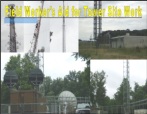Podcast: Play in new window | Download | Embed
Subscribe: Apple Podcasts | RSS
I recently put a post out about unionizing tower climbers. The main response from the many people who were against unions, (many using the auto industry as the standard), coming into the tower industry told me the industry should police itself. I agree, it should. Is that happening? Apparently not, 12 deaths this year and who knows how many near misses and injuries. Isn’t that what the industry is doing now, policing itself? Apparently not, OSHA is policing the industry. Shouldn’t part of the responsibility fall on the carriers and the customers? I would think so but when something happens no one really investigates the end-user or the tower/monopole/water tank owners. Maybe the tower owners who say they are going the extra mile to make sure their towers are safe, but when an accident happens they are not looked at either. Apparently it is up to the climbers to police themselves. Some tower crews do an outstanding job while others don’t. That’s the way it is. OSHA is doing all they can. The FCC is helping. PCIA is setting training standards. Vocational schools are starting classes. The FCC and DOL got together to create TIRAP, a voluntary program defining an apprenticeship program to follow. I think it’s a great idea, setting a standard for all to follow. You know, like the voluntary wearing of seatbelts. I mean, did they really need to pass a law to make people wear seatbelts? Oh, right, yes, a law was passed because no one cared about wearing a seatbelt until it was a law and the police could pull you over for that reason. Did drivers police themselves in that case, no, and it didn’t cost near the money that tower climbing safety training and gear does.
How many people have to die before there is more intervention? Apparently more than 12 a year. Listen, no one wants anyone to die or get hurt. We really want everyone to be safe. I know that equipment fails and accidents happen and that will continue to happen. I would like to think that we are doing everything we can to be safe. However, I still hear about the horror stories of the industry where companies will initially get everyone trained until they get all the contracts from the carriers or turf vendors. Most companies start with good intentions. Then to save money they do on the job training (OJT) and skip the formal training. So is this the way we are going? Saving money by doing the minimal amount to get by? No first aid or CPR or ongoing rescue training, just the bare essentials to get approvals and then just hire whomever to make more money. This is where they should have in-house training so they can tailor the safety program, but so often this can be corrupt as well. In house programs can be great, I have seen some awesome trainers but by the same token I have seen companies pull the plug on the in-house program because of time and money. This is why TIRAP was set up, to set the standards for training, OJT, and apprenticeship as to prepare the new climbers for the career ahead of them. It costs time and money, two things that the climbing companies have a hard time getting. Look at MasTech, they trained a whole group of people only to have AT&T pull the plug and force MasTech to lay them off. Who do you hold responsible for that debacle?
Deployment and tower climbing digital products to help with your needs. If you are starting out I have an eBook or Audiobook, Tower Climbing: An Introduction and Field Worker’s Aid for Tower Site Work. Learn and understand the SOW and how it can help you get paid or at least take the customer to court go ahead and order my SOW Training files. Go ahead and share the information! Let others know.
Something to think about, the carriers are spending over $44 Billion to buy spectrum. There will be so much work coming up in the next 3 to 6 years. Much engineering work has been automated but crews are still needed to hang equipment on towers, poles, monopoles, and water tanks. Wouldn’t it be nice if we trained people properly and if they got the ongoing training they needed? Would it be great if they got paid for the work that they did? Getting paid is part of safety because safety is not cheap, training and safety gear costs money. If you don’t get paid you may have to cut back. Who is monitoring the payments to the contractors? It doesn’t appear to be the end customer.
So is the industry policing itself? In some cases, yes. There are business owners that run the company like they care. They train and they support their workers. They fire customers that don’t care about safety and put the schedule ahead of a life. They select who they wish to work with and for. They take the time to show that the business of safety and training is a culture, not an annoying practice to follow because the customer told you to.
I know many climbers and foreman and project managers that care, they know that a life is valuable. I also am hearing about more and more that don’t care because they have a schedule to keep. Everyone looks at an accident to see how to prevent it, but who is looking at the industry to make sure it’s policing itself? It should be every climber out there who has a foreman or PM that asks you to put the job ahead of their life. The reality is that a select few, (some climbers, some crew owners), and OSHA. They are trying to prevent this from happening in the first place. The FCC is assisting. The problem with relying on the government entities is that they are overwhelmed and understaffed.
So I would like to ask Verizon Wireless, AT&T Wireless, Sprint, and T-Mobile to put safety and site audits in their budgets for the upcoming growth. They really not only need to be following up on the contractors and the Turf vendors but dropping in to see the work happening unannounced. They should be talking to random installer during and after the installations to check the pulse of the industry. That is something they could do to make sure the GCs are doing their job. They should be hiring trained and competent crews. They should also follow-up to see that those crew are getting paid! I think that is why AT&T wanted to deploy with someone like MasTech, my opinion only! I believe AT&T would like to see the industry improve. I also think that Verizon Wireless really wants to make sure the deployments are safe and paid for.
By the way, do you know why people don’t stay in wireless? It is usually because of the business practices and getting paid. It is so hard to stay involved in this business. People that stay in wireless do it because it is a passion. How does the industry reward them? By torturing them with horrible schedules, low pay and poor business practices. For instance, if you get hurt on a job, you may not get paid because they will bring someone else into complete it. So you are injured, out of work, not getting paid, and the customer just moves on, status quo, business as usual. Meanwhile, the hurt climber and their family are left alone to deal with the legal issues that ensue. Who is there for them? Hubble Foundation and that’s about it outside of friends and family. The lawyers are there, but they may be looking out for one of the companies involved, not the person.
Be smart, be safe, and pay attention. You should have a plan in place even though you may need to improvise. After all, you need to have a guide to follow for the project and for safety.
Support the Hubble Foundation! When a climber gets hurt, they are there. When a climber is stranded they are there. When a climber gets stuck somewhere they are there. Would you want someone to help you out if that happened?
By the way, OSHA has not updated their site yet with the latest fatality numbers. OSHA Communications Tower
Find more business on the Wireless Estimator Bluebook



























